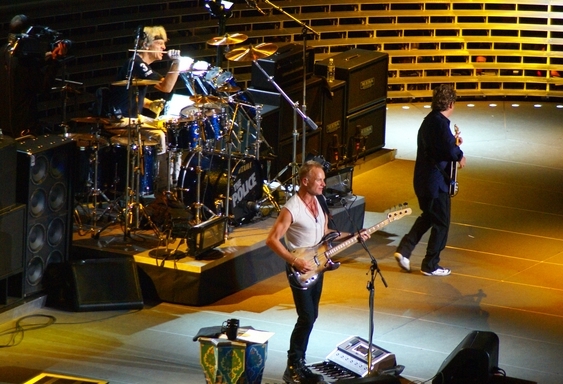
The Police
The Police were an English rock band formed in London in 1977.[1] Within a few months of their first gig, the line-up settled as Sting (lead vocals, bass guitar, primary songwriter), Andy Summers (guitar) and Stewart Copeland (drums, percussion), and remained unchanged for the rest of the band's history. The Police became globally popular in the late 1970s and early to mid 1980s. Emerging in the British new wave scene, they played a style of rock influenced by punk, reggae, and jazz.
This article is about the band. For other uses, see Police (disambiguation).
The Police
London, England
- 1977–1986
- 1992
- 2003
- 2007–2008
Their 1978 debut album, Outlandos d'Amour, reached No. 6 on the UK Albums Chart on the strength of the singles "Roxanne" and "Can't Stand Losing You". Their second album, Reggatta de Blanc (1979), became the first of four consecutive No. 1 studio albums in the UK and Australia; its first two singles, "Message in a Bottle" and "Walking on the Moon", became their first UK number ones. Their next two albums, Zenyatta Mondatta (1980) and Ghost in the Machine (1981), led to further critical and commercial success with two songs, "Don't Stand So Close to Me" and "Every Little Thing She Does Is Magic", becoming UK number-one singles and Top 5 hits in other countries; the former album was their breakthrough into the US reaching number five on the US Billboard 200.
Their final studio album, Synchronicity (1983), was No. 1 in the UK, Canada, Australia, Italy and the US, selling over 8 million copies in the US. Its lead single, "Every Breath You Take", became their fifth UK number one, and only US number one. During this time, the band were considered one of the leaders of the Second British Invasion of the US; in 1983 Rolling Stone labelled them "the first British New Wave act to break through in America on a grand scale, and possibly the biggest band in the world".[2][3] The Police disbanded in 1986, periodically reuniting for one-off performances before fully reuniting in early 2007 for a world tour that ended in August 2008. They were the world's highest-earning musicians in 2008, due to their reunion tour, which was the highest-grossing tour of 2007.[4][5]
The Police have sold over 75 million records, making them one of the best-selling bands of all time.[6][7][8] The band won a number of music awards, including six Grammy Awards, two Brit Awards—winning Best British Group once, and an MTV Video Music Award. In 2003, they were inducted into the Rock and Roll Hall of Fame.[9] Four of their five studio albums appeared on Rolling Stone's list of the "500 Greatest Albums of All Time". The band were included among both Rolling Stone's and VH1's lists of the "100 Greatest Artists of All Time".[10][11]
History[edit]
1977: formation[edit]
On 25 September 1976,[12] while on tour with the British progressive rock band Curved Air in Newcastle upon Tyne, in the northeast of England, the band's American drummer, Stewart Copeland, met and exchanged phone numbers with ambitious singer-bassist Gordon Sumner, a.k.a. Sting,[13] who at the time was playing in a jazz-rock fusion band called Last Exit.[14] On 12 January 1977,[15] Sting relocated to London, and on the day of his arrival, sought out Copeland for a jam session.[14]
Musical style[edit]
The Police started as a punk rock band, but soon expanded their music vocabulary to incorporate reggae, pop and new wave elements to their sound. In his retrospective assessment, Stephen Thomas Erlewine of AllMusic argues that the notion of the Police as a punk rock band was true only "in the loosest sense of the term". He states the band's "nervous, reggae-injected pop/rock was punky" and had a "punk spirit" but it "wasn't necessarily punk".[84] A "power trio",[85] the Police are also known as a new wave[86] and post-punk band,[87][88] with many songs falling in the reggae-fusion genre.[84]